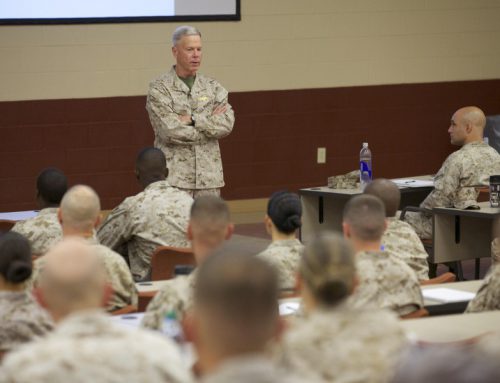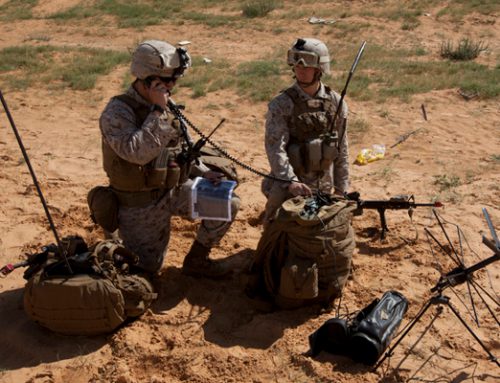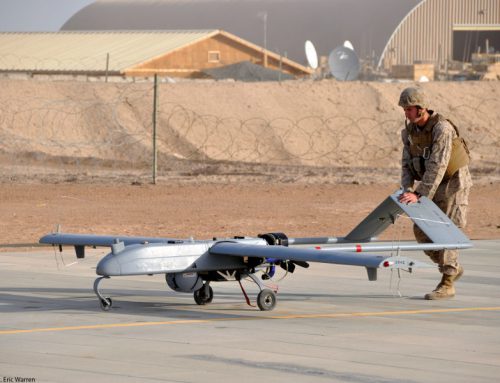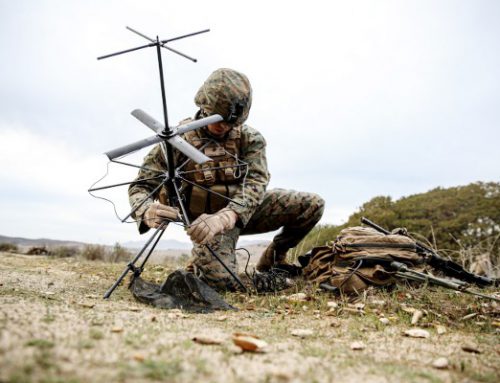There are 3 components of Communications School that will be covered here. They are all major events and each marks a point of increased pace in the POI.
FEX I: SINGLE CHANNEL RADIO
While Communications School Field Exercises are by no means a nice holiday jaunt, they do involve far less hiking, walking, and otherwise physically wearing yourself down compared to The Basic School. That said, they are incredibly demanding, especially for billet holders.
Here’s how it’s set up.
Your class is split into three groups: RCT-6 (Regimental Combat Team 6), 1/6 (1st Battalion 6th Marines), and 2/6 (2nd Battalion 6th Marines). Essentially, that means a higher (regiment) and two subordinate units (battalions). Students essentially represent the comm platoon for each unit. Each site gets maybe 12 humvees and a 7-ton to play around with, all of which have power amplified radios. A number of man-pack radios, remoting devices, antennas, a COC (combat operations center) tent, generators, and all the gear you need to set up a Command Post is also available.
Each group goes to a different spot in the training area , and attempts to set up comm and talk to each other. Periodically the units will conduct “attacks” (aka, the imaginary grunts are attacking), and the group will have to split into a “tactical” command post and a “main” command post, and leap frog to maintain control of the battle. This is quite a process that requires extensive practice setting everything up, taking it down, packing it into humvees, and setting it up again. All in all, the idea is to simulate supporting your CO (the battalion or regimental commander) with continuous radio comms during kinetic combat operations. As you will discover, this is not an easy task. You’ll spend most of your day troubleshooting a certain net that’s giving you issues or planning your next move.
Bottom line:
- FEX I = not a lot of sleep
- Billets are really tough
- A lot of learning occurs.
MASTERY I
Masteries make up the majority of your grade at comm school. Essentially, you’re given a scenario and come up with a plan. For example:
- You are the Communications Officer for 4th Marine Regiment
- You about to invade Country X
- You are given the ground scheme of maneuver.
- Plan communications
You’re given about three days to accomplish (e.g., Friday and the weekend). You will spend all three days working if you want to get it done relatively well. As you might expect, it’s not nearly as simple as it sounds.
During that three days come up with a plan, use some systems planning and engineering software to model it, and make a power point with fancy maps and slides. You brief it to a Captain who grades you.
There’s not a lot that can be said about Mastery other than that, because quite a bit of it is a closely guarded secret for integrity purposes. During that 3 day period, you’re literally not allowed to talk to other students about anything comm school related.
DATA / CISCO / CCNA
If you go to comm school, data will hit you fast and hard immediately after your first mastery. As of right now (this may change in the future), Communication Officers cover the CCNA Module 1 certification test in a period of one week. It takes most people about a semester, and you will do it in a week.
A little over half the class failed the certification test and had to try again. It can be done even with no technical background. Study hard and you will be fine.
So what exactly is it that you learn? Basically you learn how to set up computer networks and how the internet works. It’s actually incredibly interesting, but difficult to understand at first. You learn how to plan, install, program, and operate routers, swtiches, and other network equipment. The modern battalion commander has a wide variety of command and control applications available. Programs allow them to see where all their units are, chat, email, or even Skype higher command. Communications Officers learn how to set that up.
In addition to being interesting, this portion of the course also gives you the first part of a major civilian certification from Cisco (the company that provides network hardware for most major corporations), and SERIOUS job credibility should you choose to leave the Marine Corps. People pay good money to get these skills. You’ll get the certifications, and the experience, for free.






Leave A Comment